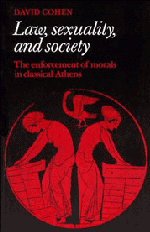Book contents
- Frontmatter
- Contents
- Preface
- 1 Introduction
- 2 Models and methods I
- 3 Models and methods II
- 4 Public and private in classical Athens
- 5 The law of adultery
- 6 Adultery, women, and social control
- 7 Law, social control, and homosexuality in classical Athens
- 8 The prosecution of impiety in Athenian law
- 9 The enforcement of morals
- Bibliography
- Index
- Frontmatter
- Contents
- Preface
- 1 Introduction
- 2 Models and methods I
- 3 Models and methods II
- 4 Public and private in classical Athens
- 5 The law of adultery
- 6 Adultery, women, and social control
- 7 Law, social control, and homosexuality in classical Athens
- 8 The prosecution of impiety in Athenian law
- 9 The enforcement of morals
- Bibliography
- Index
Summary
If privacy occupies a central place in contemporary discussions of the enforcement of morals, its role in the Athenian context was no less important. Plato, for example, clearly realized that if a state was to carry out a program of moral education privacy was one of the most significant barriers that would have to be overcome. Analyzing the conceptions of privacy in the context of political ideology at Athens is a relatively straightforward matter, for which Aristotle, Plato, and the Athenian orators provide a great deal of interesting evidence. The foregoing chapter has suggested, however, that while political ideology may be important, it is far from the whole picture, representing only one aspect of the social system that a full presentation must take into account. Here the question presents itself: how, for an ancient society, can the historian reconstruct the rich texture of social practice? In my view, comparative evidence from contemporary social anthropology can play a crucial role in such an undertaking. This chapter illustrates the use to which anthropological models may be put in sorting out the historian's “jigsaw puzzle” alluded to above. To put it another way, though ancient historians commonly label communities like classical Athens “face-to-face” societies, they rarely (if ever) provide a detailed account of the structures and practices which define such social systems. The richness of the anthropological record describing contemporary Mediterranean “face-to-face” communities vastly exceeds that available for any ancient society.
- Type
- Chapter
- Information
- Law, Sexuality, and SocietyThe Enforcement of Morals in Classical Athens, pp. 35 - 69Publisher: Cambridge University PressPrint publication year: 1991
- 1
- Cited by

